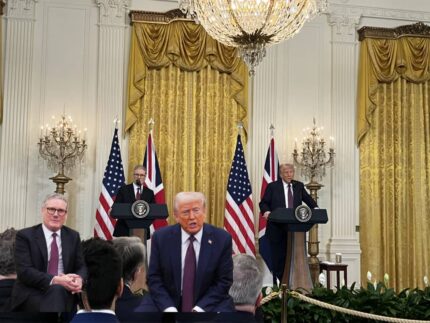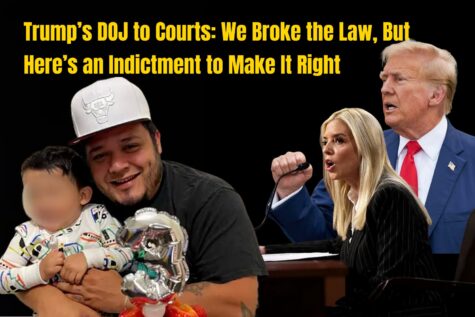British Prime Minister Keir Starmer and U.S. President Donald Trump held a crucial meeting in Washington this week, addressing pressing global issues including the Ukraine conflict, trade relations, and NATO commitments. With Europe seeking clarity on Trump’s stance on transatlantic cooperation, Starmer navigated the discussion with strategic diplomacy, aiming to reinforce the “special relationship” between the United Kingdom and the United States.
A Diplomatic Gesture: King Charles’ Invitation to Donald Trump
Prime Minister Starmer surprised Donald Trump with a personal letter from King Charles III, inviting the U.S. president for a second state visit to the United Kingdom. The gesture, unprecedented for a sitting U.S. president, was a clear effort to reaffirm strong U.S.-UK ties.
Trump, visibly pleased, accepted the invitation, calling it an “honor” and praising the King as a “wonderful man.” The move highlighted Starmer’s attempt to build a personal rapport with Trump, whose diplomatic relationships often hinge on individual connections rather than traditional statecraft.
The invitation also signals the UK’s desire to maintain close ties with Washington, even as European allies worry about Trump’s shifting foreign policy priorities. By leveraging the monarchy’s influence, Starmer positioned himself as a leader willing to engage Trump on a personal level to secure political cooperation.
Ukraine Conflict: Donald Trump’s Position Remains Uncertain
One of the most anticipated discussions revolved around Ukraine, where Starmer sought U.S. assurances on continued support against Russian aggression. Trump, who has previously been ambiguous about NATO and Ukraine, refrained from making firm commitments but showed a slight shift in tone.
Unlike his past remarks where he labeled Ukrainian President Volodymyr Zelenskyy a “dictator,” Trump acknowledged Ukraine’s resilience, stating, “They have fought bravely.” He also hinted at a potential economic agreement, proposing a rare earth minerals deal with Ukraine as a form of indirect security guarantee. Trump suggested that having American workers in Ukraine could serve as a deterrent against Russian aggression.
However, this approach falls short of the security assurances that European leaders were hoping for. While Starmer reiterated the need for a “fair and lasting peace,” Trump’s reluctance to commit to military aid or NATO reinforcements leaves Ukraine’s future uncertain.
Trade Relations: A Positive Outlook for the UK
Starmer pressed Donald Trump on trade, particularly on U.S. tariffs on European imports that could impact British businesses. Trump, who has been vocal about imposing heavy tariffs on EU nations, appeared open to negotiating a special trade deal with the UK.
“You’ve earned whatever the hell they pay you over there,” Donald Trump told Starmer, hinting at the prime minister’s effective lobbying skills. He suggested that tariffs on British goods might not be necessary if a new trade agreement was reached, signaling a potential breakthrough in U.S.-UK economic relations.
While Trump’s statements are not legally binding, they indicate a willingness to grant the UK favorable terms, possibly distinguishing it from broader European trade disputes. Starmer’s ability to extract a softer stance from Trump on trade could be a crucial win for Britain’s post-Brexit economic strategy.
Chagos Islands Sovereignty: A Diplomatic Win for Starmer
A significant, yet often overlooked, issue discussed was the sovereignty of the Chagos Islands, a British-controlled territory in the Indian Ocean. Starmer’s government has been negotiating the return of the islands to Mauritius, a move that requires U.S. approval due to the strategic American military base on Diego Garcia.
Donald Trump expressed willingness to support the deal, provided a long-term lease agreement was secured to maintain the U.S. military presence. He suggested a potential 140-year lease, allowing Britain to transfer sovereignty while ensuring strategic military interests remain intact.
This development marks a major diplomatic achievement for Starmer, as uncertainty over the Chagos Islands had been a point of contention in UK foreign policy. Gaining Trump’s backing strengthens Britain’s ability to follow through on its legal and diplomatic commitments while maintaining close U.S. defense cooperation.
NATO and Defense Spending: A Calculated Tightrope Walk
With Trump’s history of criticizing NATO allies for not paying their “fair share,” Starmer arrived in Washington with a clear message: Britain is committed to increasing its defense budget. He reaffirmed plans to raise defense spending to 2.5% of GDP by 2027 and 3% by 2035—one of the biggest sustained military investments since the Cold War.
While Trump did not outright endorse NATO’s traditional role, he appeared more receptive to the UK’s commitments. Starmer strategically framed Britain’s increased spending as a move that benefits U.S. security interests, appealing to Trump’s transactional approach to international relations.
However, Trump’s broader position on NATO remains uncertain. He did not provide explicit assurances on whether the U.S. would step in to support European defense against Russian threats, leaving European allies concerned about his long-term commitment to the alliance.
A Mixed Outcome for Starmer and the UK
Keir Starmer’s meeting with Donald Trump was a high-stakes diplomatic engagement with both opportunities and challenges. While he secured positive signals on trade and the Chagos Islands, Trump’s stance on Ukraine and NATO remains unpredictable.
By leveraging personal diplomacy—through the King’s invitation and direct economic appeals—Starmer positioned himself as one of the few European leaders capable of engaging with Trump on a practical level. However, whether this engagement translates into concrete policy shifts remains to be seen.
As Europe braces for further geopolitical uncertainty, Starmer’s ability to navigate the complexities of the U.S.-UK relationship under Trump’s leadership will be critical in shaping Britain’s global standing in the years ahead.














